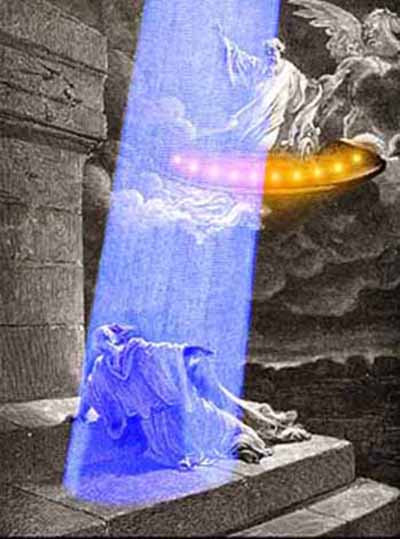
There are many ways to perceive angels,
but more than likely they were ancient aliens.
Some believe. Some don't. However you are programmed.

There are many ways to perceive angels,
but more than likely they were ancient aliens.
Some believe. Some don't. However you are programmed.

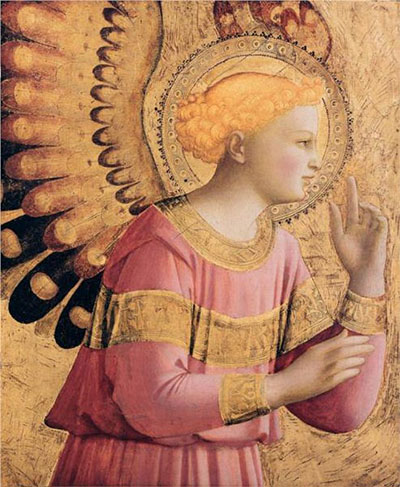
Are Angels Real?
Live Science - March 30, 2018Angels surround us all the time - figuratively if not literally - especially during the holidays. They appear in paintings, etchings, figurines, T-shirts, posters and just about everything else. Angels appear in several religions; for example, in Islam, angels are said to be made of light, while Christian angels were willed into being by God. Early versions of angels had no gender, though later Christian angels were tall, slender males with soft features, often dressed in flowing robes specially tailored around their large white wings. Angels are said to be either immortal or greatly long-lived. Read more ...

Angels are usually viewed as emanations of a supreme divine being, sent to do the tasks of that being. Traditions vary as to whether angels have free will or are merely extensions of the supreme being's will. While the appearance of angels also varies, many views of angels give them a human shape.
The word 'Angel' is taken from the Greek word 'Angelos' which means 'Messenger'. Angels are those souls who from the beginning of creation never lost contact with the Creator, never had physical lives, and seek only to fulfill the will of the Creator. Angels can vary in form, depending on the needs and expectations of those requesting help. They may appear as either male or female, but are neither. They are beings of light energy. They came into being as a link between the Creator and humanity. They bring us messages to guide and protect us during the spiritual transformation that is taking place now on the planet. Angels are different in many respects from Spirit Guides. They usually come with a frequency of unconditional love whereas spirit guides have personalities and are often humorous and talk a lot!
In the Middle Ages Angels were depicted as bringing messages, such as the birth of Christ. They were usually depicted as human-like beings, which huge wings, halos, and radiating white light.
Angels have been recognized by major religions as having a very important place in the overall plan of creation. The idea of Angels is significant in Judeo-Christian religious thought. In both the Old and New Testaments, angels are identified as belonging to specifically named groups, in a kind of celestial hierarchy, consisting of Nine Orders. Before the advent of Christianity, angels as messengers had their belief counterparts in Ancient Greece, where Hermes - (Thoth - Tehuti) was considered a messenger of God, and in Rome, where he was called Mercury. The Vikings also had a messenger God called Hermod.
As we prepare to return to a higher level of consciousness many people are connecting with Angels. Though they usually do not remain with one person exclusively, they can come to when you call them.

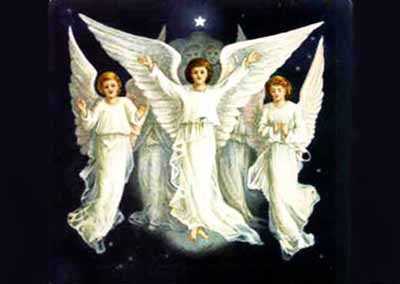
The Choir is the name used for the order of angels, a method of organization that proposes a kind of celestial hierarchy for the entire angelic realm. The term choirs is probably derived from one of the most central roles of all angels, the singing of praises to God so that all of heaven and Creation reverberate with the joyous sound. The inderlying principle of the angelic choirs is rooted in the metaphysical understanding of varying degrees of angelic perfection or the extent to which each order reflects the perfect light of God's illuminative love.
The Angels of creation are a group of seven angels who are said to have been in existence before Creation of the world. That angels may have been created before the birth of the world is attested to by this passage in Job (38). According to the Second Book of Enoch, a useful source for angelic lore, the seven angels reside in the sixth heaven.There remains, however, serious discussion among angelologists as to when God created the angels.
The ninth and final order of angels according to the organization of the celestial hierarchy as created by the sixth-century theologian Dionysius the Areopagite; the angels belong to the third and final triad of choirs, with the archangels and principalities, the primary focus of their existence being the caretakership of humanity and the world. While the lowest rank of all angelic beings-if one accepts the idea of a regulated angelic organization-angels are nevertheless members of the heavenly host and thus possess the profound and beautiful attributes given to them by their Creator. They are beings of pure spirituality and exist to fulfill the tasks given to them by God. Chief among these are to act as messengers of the Lord to the Earth and guardians of the human soul.
We are most familiar with the angel realms. Angels work most closely with humanity. There are angels for healing, illumination, creativity, nature, music, dance, writing and literature, protection, emotions, politics, science and technology, devotion, purity, information, salvation, environment, transformation, peace, art, relationships, ceremonial order and magic. All you have to do is call (invoke) them and they will come.

Also called tutelary angels, the well established and widely accepted belief that all people (as well as nations, cities, and churches) have a special angel who stays with them, watching over their lives and encouraging their spiritual well-being and happiness. Many deny that guardian angels could possibly exist, but others state, with the support of Scripture, theological writings, and common sense, that they do live, even if mortals forget or refuse to acknowledge their presense. The idea of the guardian angel is found in Judaism, Christianity, and Islam, and the roots of the belief date to the earliest times. St. Thomas Aquinas, one of history's foremost experts on angels, stated that all people have guardian angels. They remain with one throughout life, staying ever at one's side even during sin. They foster good works and help to direct the soul to salvation, but only if the soul is so inclined to be led.They cannot influence the will, but they do act upon the senses and project themselves upon the imagination and intellect, discouraging evil acts. According to Thomas, the angels remain even after death, standing with the soul in heaven; there, however, it does not encourage salvation, but assists in the glimpsing of the final brightness of eternal bliss. All guardian angels are taken from the lowest ranks of the celestial hierarchy, namely the choir of angels.

The angels who are to appear at the Last Judgment, the final day, when all who have ever lived will be brought before the throne of God. The idea of the Last Judgment is especially prominent in Islamic and Christian lore. In the latter, the angel Israfel shall play a blast upon his mighty trumpet to awaken the slumbering dead. Some angels will be spared the effects of the first blasts, but after the third or fourth even they shall be destroyed by the Lord and the end of time will have descended upon all of creation. In the Christian tradition, the Second Coming of Christ will be announced not by Israfel, but by Gabriel, who will likewise sound an irresistible note upon his trumpet. Also prominent in the expected Day of Judgment is St. Michael the Archangel, captain of the hosts of the Lord, who will presumably have just led the heavenly hosts in their final triumph over Satan and the legions of darkness.

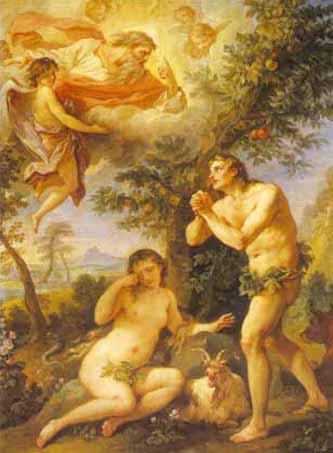
The Earthly Paradise that was the first abode of Adam and Eve until their expulsion from the garden, an event recorded in the Old Testament Book of Genesis. Deriving its name perhaps from the Sumerian word eden, meaning "plain" (or perhaps from a word denoting "pleasure"), Eden was supposedly located in the Near East, close to Israel, its precise locale narrowed by the position of four rivers that formed out of the river that flowed out of Eden and nourished the garden: the Pishon, the Gihon, the Trigris, and the Euphrates, rivers that would seem to place the garden in the fertile crescent. Attempts to locate the garden, however, have (not surprisingly) proven unsuccessful. Beyond the fearsome cherubim (listed often as Metatron or Jophiel), there are a number of associations between angels and the garden. For example, the famed archangel Raphael is said to be the angel responsible for guarding the tree of life; this angel was also named by John Dryden in his poem "State of Innocence, or the Fall of Man," as being the very angry angel who tossed Adam and Eve out of Paradise. In Paradise Lost by John Milton, however, this task was given to the archangel Michael.

The angel who is charged with the special protection and guardianship of Egypt. Ranked as one of the guardian angels of nations (see Guardian Angels), this angelic patron has been given various identifications, including Samael (a chief angel of the fallen angels), Mastema (the accusing angel), and Duma. The latter angel is most often considered the proper angel of Egypt. He was most vociferous in defense of his charges, going so far in legend as to empower the accomplished wizards of Egypt to perform the same feats of magic as Moses when the Lawgiver arrived at the court of the pharaoh and tried to impress him enough that the Israelites should be freed from their bondage (an event recorded in the Old Testament Book of Exodus). According to legend, recounted in Louis Ginzberg's The Legends of the Jews, the angel descended to the land of the Nile to give succor to his people upon departure of the Jews, stopping long enough to put a fright into the Israelites by an impressive demonstration in the air. As Jewish custom declares all the guardian angels of nations to have fallen (save, of course, for the ever-redoubtable St. Michael), the angel of Egypt joined denizens of the hoary netherworld; it is unclear whether the Lord ever appointed a successor.

The collective name given to a group of twenty-four beings who sit upon thrones encircling the throne of God, as described by St. John in the Book of Revelation. It is often believed by scholars and interpreters of Revelation that the elders are, in fact, to be counted as great angels, perhaps a secret or distinct order of angelic beings. It is unclear where exactly the elders reside, although the Second Book of Enoch lists them as inhabiting part of the first of creation.

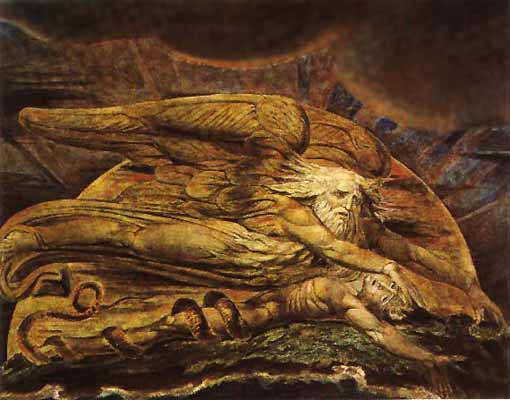
The Hebrew name for God (Yahweh), the plural of eloha, meaning "god"; while technically a plural word, the singular Elohim was used and understood as the Hebrew conception of the God of Israel, the one true God. In Hebrew texts of the Old Testament, the word Elohim was used variously with other words or conjunctions such as ha- to make entirely clear that this is "the" God and not some other deity or personage. This grammatical addition was considered essential because elohim had also been used for earlier goddesses-its root, in fact, came from the Canaanite word el-and for such beings as angels. The application of elohim (perhaps to be defined as "sons of God") has been given to angels in the sense that they represent God as messengers and thus are equatable or synonymous with God himself. It can be argued, however, that the elohim might constitute their own order or choir, as was maintained by the fifteenth-century scholar Pico della Mirandola. When he compiled his own list of the angelic choirs, he placed the elohim in ninth place.

AAlso termed the grigori, a group of angels who figure in Jewish legend; they are reputed to have members who fell onto sin and others who stayed devoted to the cause of the Lord. Originally the watchers were apparently some of the most august angels in all of heaven. They never slept, kept eternal vigilance over heaven, and were some of the tallest beings in all creation. According to the Book of Jubilees (supported to some degree by the First Book of Enoch), they were sent to earth to give instruction to mortals on nature and other knowledge considered useful for them to have by the Lord. Unfortunately several watchers became enamored with human women and so cohabited with them. <> Their offspring were the nephilim, the giants who were mentioned in the Book of Genesis and who supposedly troubled the world with their cruelty and evil; the nephilim were all but exterminated in the Flood. There is also another group of mighty angels called the watchers. Known in Hebrew as the irin or irin qaddisin, these angels are said in the Third Book of Enoch to number only two and are the close companions of the holy ones. They are greater than all the other angels combined, matched by no other other creatures in the entire heavenly host. They reside directly next to the very throne of God and, with the holy ones, act as the court officials of heaven, debating every case that comes before the blessed throne. The watchers and the holy ones were mentioned in the Book of Daniel (4:17).

The angels who have authority over the seven days of the week-in much the same fashion as there are angels presiding over the planets, hours of the day, and months of the year. The angels give their particular day their special attention and in legend can be invoked to assist a person in some endeavor or need. The angels and their days are reported in The Magus (1801) by Francis Barrett:
Sunday-Michael
Monday-Gabriel
Tuesday-Camael
Wednesday-Raphael
Thursday-Sachiel
Friday-Anael
Saturday-Cassiel

The tradition that there are ruling angels who watch over or govern the twelve signs of the zodiac. They are often to be considered synonymous with the various angels of the months of the year. Specifically, the angels of the zodiac are as follows:
Aries: Machidiel
Taurus: Asmodel
Gemini: Ambriel
Cancer: Muriel
Leo: Verchiel
Virgo: Hamaliel
Libra: Uriel
Scorpio: Barbiel
Sagittarius: Adnachie
Capricorn: Hanael
Aquarius: Gabriel
Pisces: Barchiel

A choir or order of angels that appears in a certain aspect of Jewish lore. An angelic choir by the name of flames is not normally counted among the traditionally accepted orders of angels. They can perhaps be equated with one of the recognized choirs of angels.

By tradition, the food of the angels and the blessed in heaven; it is best known as the food sent to the Israelites as they fled from Egypt and wandered in the desert under the leadership of Moses. Meaning in Aramaic "What is this?" manna was described in the Book of Exodus as "like coriander seed, white, and the taste of it was like wafers made with honey." This is generally accepted meal of the angelic hosts, although there is naturally some question why angels, being entirely spiritual creatures, might have need for substantial food.

The collective name for those angels appearing in the lore and traditions of the mystical Jewish sect of the Merkabah. The Merkabah (or Merkava)-meaning "Chariot"-flourished in Judaism from the time of the first century A.D. and continued in various centers throughout the early Middle Ages. Adherents of the sect believed in the necessity and desirability of using esoteric and mystical means to ascend through the great seven heavens or mansions, called hekhalot ( or hechaloth), to the glorious throne of God, which rests upon an in comparable chariot-the Merkabah. The seal-keeping angels are sometimes equated with the seven merkaboth, a group of angelic beings who stand as the corresponding figures of the seven heavens. They can perhaps also be identified as the virtual embodiment of the heavens themselves. Aside from these angels, the Merkabah accepted that there were groups of angels always surrounding the throne of God. These were said to include the seraphim, the galgallim, and especially the hayyoth.

One of the most important of all duties of angels, so much so that the very Hebrew word mal'akh and greek word angelos, denoting these beings, both mean "messenger." The angel stands as one of the central intermediaries or representatives of the Lord to humanity. Existing entirely at the will and in the service of God, the angel is frequently dispatched to earth to deliver some important revelation or declaration, usually having much impact upon the lives of the recipients. Aside from the other tasks given to them in relating to earthly affairs, angels are mentioned frequently in the Bible in the ministering role of messengers. While angels have many other duties in tradition, both in heaven and on earth, their role as messengers is still one central to their existence, serving to remind an often forgetful world that God loves all of his Creation and is concerned for its well-being.

The name given to certain powerful and highly placed angels who are honored with the title of prince or ruling princes of heaven. The angelic princes are found especially in Jewish lore, with princes governing not only the seven heavens, but the angelic orders or choirs. Following are some of the princes of the individual choirs:
Seraphim: Michael, Metatron, Uriel, Seraphiel, and Satan (before his Fall)
Cherubim: Gabriel, Raphael, Uriel, Zophiel, and Sata (before his fall)
Thrones: Zaphkiel, Raziel, Orifiel, and Jophiel
Dominations: Zadkiel, Zacharel, and Muriel
Virtues: Gabriel, Michael, Uzziel, Tarshish, Sabriel, and Peliel
Powers: Camael, Gabriel, Verchiel, and Satan (before his Fall)
Principalities: Amael, Nisroch, and Haniel
Archangels: Metatron, Raphael, Michael, Gabriel, Barachiel, Jehudiel, and Satan (before his Fall)
Angels: Gabriel, Chayyliel, Phaleg, and Adnachiel
Seraphim - Choirs
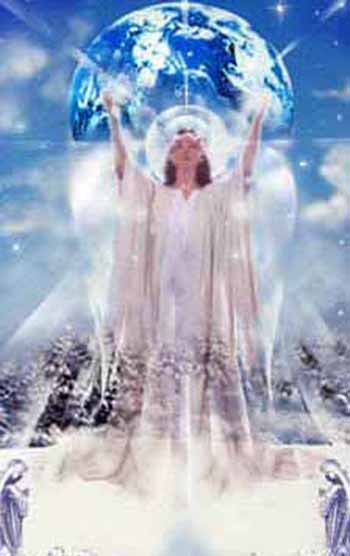
The highest and most splendid of the nine accepted angelic orders as developed by the sixth-century theologian Dionysius the Areopagite and largely embraced by the Christian Church. Not only are the seraphim the highest of the nine choirs, they are ranked first in the first triad of the Dionysian scheme, with the cherubim and the thrones. Without question they are the closest in all of heaven to the very throne of God, and their primary function is to circle the incomprehensibly beautiful throne in perpetual adoration of the Lord. According to Enoch, each seraphim has six wings. The last detail is corroborated by the Old Testament Book of Isaiah (6:1-3).
They are celestial angels that are said to surround the throne of God. They are the regulators of the movements of the heavens and have untold responsibilities in the administration of God's infinite universe. Heavenly counselors - guardians of the Light throughout the universe. Have little contact with beings on Earth. They keep celestial records.
The Sumerian original version of them was that they were entities that were relatively fierce looking beings that had the body of an ox or horse and the face of a man with a long beard and wings. They were supposed to have been sent to guard the Tree of Life in the Garden of Eden.
There are twelve master seraphim:
1. Epochal angels: direction of the affaires of each generation and root race
2. Progress angels: initiate the evolutionary process of creatures
3. Religious guardians: angels of the church
4. Angels of national life: angels of the trumpets, direct political performance
5. Angels of the races: work for conservation of the evolutionary process
6. Angels of the future: forecast and predict the future
7. Angels of enlightment: planetary education, mental and moral training
8. Angels of health: angelic healing corps
9. The home seraphim: preservation and advancement of the home.
10. Angels of industry: foster industrial development
11. Angels of diversion: play, humor, rest, and human leisure
12. Angels of superhuman ministry: angels of the angels.
The second of the nine accepted choirs of angels, placed second as well in the first triad of the angelic hieraechy (with the seraphim and thrones) devised by the sixth-century theologian Dionysius the Areopagite. The cherubim are some of the most powerful and awe-inspiring of all angels, standing below only the seraphim in direct closeness to God; they thus are second only to their seraphic brethren in the degree to which they emanate the love of God and possess knowledge and wisdom. Their illuminative knowledge and wisdom are thus so great as to be utterly incomprehensible to the mortal mind, blinding the blessed human who has the honor of actually beholding them in this world. The cherubim are additionally given the arduous task of maintaining the records of heaven and seeing to the myriad details that must be fulfilled to maintain the heavenly host. Dionysius declared them to be guardians of the fixed stars. By the Hebrews they were called kerub, a name that may mean "one who intercedes"; Their chiefs are named as being Cherubiel Kerubiel), Ophaniel, Gabriel, Uriel, Raphael, and Zophiel.
They are heavenly counselors and companion angels of all of the planets. One of the nine choirs of angels, as accepted on lore and determined by the sixth century theologian Dionysius the Areopagite. Called the ophanim or galgallim in Hebrew traditions, the thrones are also termed the "wheels" and the "many-eyed ones." The name 'wheels' was derived from the Hebrew word ophanim (later galgallim, "wheels" or "spheres"), itself based on the vivid description of these angels found in the Old Testament Book of Ezekiel (1:13-19).
They belong to the first and highest triad of the heavenly host, standing just below the seraphim and the cherubim; this position makes them some of the most powerful angels in the service of the Lord. According to St. Thomas Aquinas, the thrones have the task of pondering the disposition of divine judgments, meaning that they carry out or fulfill the divine justice of the Lord. Like their counterparts in the first angelic triad, they come the closet of all angels to spiritual perfection and emanate the light of God with mirrorlike goodness. In some Jewish lore the thrones function within the heavenly scheme of things as either the chariots upon which the throne of God rests (the Merkabah) or as the wheels of the chariot. This imagery is expressed fully in the Old Testament Book of Ezekiel (1:13-21), where they appeared with the cherubim.

Domination Choir
One of the nine accepted orders or choirs of angels, called also the dominions and the lords and termed in the Hebrew the hashmallim. In the celestial hierarchy as organized by sixth-century theologian Dionysius the Areopagite, the dominations belong to the second triad, with the virtures and powers, and are ranked fourth overall among the angelic choirs. The chief or ruling princes of the order are said to be Hashmal, Zadkiel, Muriel, and Zacharael. According to Dionysius, the denomintions have the duty in the heavenly host of regulating the tasks of the angels, and "through them the majesty of God is manifested.' Through the efforts of the dominations-who are naturally seen only rarely by mortals-the very order of the cosmos is maintained. They handle the minute details of cosmic life and existence, designating tasks to the lower orders of angels. By custom they are believed to wear green and gold, and their symbols are the sword and scepter, denoting their lordship over all created things. In turn, the dominations receive their instructions from the cherubim or thrones.
One of the nine choirs of angels as listed by the sixth-century theologian Dionysius the Areopagite. The virtues are ranked fifth in the heavenly host and belong to the second triad of angelic orders, with dominations and powers; as members of the second triad, they take part in the duties given to the three choirs, namely the ordering of the universe. The virtues specifically preside over the elements of the world and the process of celestrial life. Thus all heavenly bodies-from the stars and planets to the galaxies themselves-are kept in their divinely appointed routes and progress. On earth the angels maintain a watch over nature, marking and guiding every facet of natural life; rain, wind, snow, etc. In legend, two angels from this choir served as the angels of the Ascension, appearing at the moment of the Ascension of Christ. The virtues are called in the Hebrew the malakim and the tarshishim.
One of the nine accepted choirs of angels according to the celestial organization developed by the sixth century theologian Dionysius the Areopagite; also called potentates, authorities, dynamis, and forces, the powers are placed in the second triad of the nine choirs and are numbered sixth overall. The powers were supposedly the very first of the angels created by God, although this disagrees with the teaching that all angels came into existence at the same moment. They are described as having the task of defeating the efforts of the demons in overthrowing the world and are declared the awesome defenders of the cosmos against all evil and the maintaners of all cosmic order and equilibrium. They are guardians of the heavenly paths, policing the routes to and from heaven to the earth, which means that they concern themselves as well with humanity.

Principalities - Choir
One of the nine accepted choirs of angels as organized by the sixth-century theologian Dionysius and adopted largely by the Christian church. The principalities are placed first in the third triad of angels (with the archangels and angels) and are ranked seventh overall. Also called princedoms and princes, these angels are the first of the choirs most concerned with the earth and are traditionally declared to have the roles of caretakers over every nation, province, county, district, city, town, village, and house, working with the guardian angels, who are assigned to every spot and person; while this seems to be bureaucratic doubling of angelic activity, it can be argued that guardian angels function as the personal angelic protectors, while the principalities are the administrative or technical writers.
One of the accepted choirs of angels as established by the sixth-century theologian Dionysius the Areopagite; the archangels are ranked eighth in the nine choirs, above angels and below principalities. The chiefs of the choir are given as Metatron, Michael, Gabriel, Raphael, Barachiel, and Barbiel, although of them Michael is most commonly mentioned as leader the seven heavens; here they act as "rulers of the stellar orders."

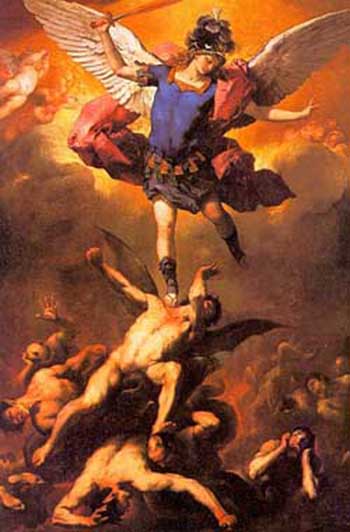
Michael is an archangel mentioned in the Book of Revelation 12:7; in the Hebrew Bible Michael is only mentioned by name in the Persian context of the post-Exilic Book of Daniel. Only there in Daniel does Michael appear as "one of the chief princes" who in Daniel's vision comes to the angel Gabriel's aid in his contest with the angel of Persia, and is also described there as the advocate of Israel (10:21, 12:1). The Talmud tradition rendered his name as meaning "who is like El (God)? (but literally "El's Likeness")" (compare the late prophet Micah), but according to Rabbi Simeon ben Lakish (230-270 CE), all the specific names for the angels were brought back by the Jews from Babylon, and many modern commentators would agree. Michael is one of the principal angels in Abrahamic tradition; his name was said to have been the war-cry of the angels in the battle fought in heaven against Satan and his followers.
The figure of Michael probably originated in Chaldaea as a protective god or spirit. Accepted by the Jews, he emerged as so major an angel in Jewish lore that he was honored as the patron angel of the nations (out of seventy, or seventy-two according to other sources) who did not fall from grace, his bias entirely understood since it favored God's Chosen People.
Much of the late Midrash detail about Michael was transmitted to Christian mythology through the Book of Enoch whence it was taken up and further elaborated. In late medieval Christianity, Michael together with St George became the patron of chivalry, and the patron of the first chivalric order of France, the Order of Saint Michael of 1469. In the British honors system, a chivalric order founded in 1818 is also named for these two saints, the Order of St Michael and St George. St Michael is also considered in many Christian circles as the patron saint of the warrior. Police Officers and Soldiers particularly American paratroopers regard him as their patron saint.
Catholics refer to him as St. Michael the Archangel and also simply as Saint Michael while Orthodox Christians refer to him as the Taxiarch Archangel Michael or simply Archangel Michael.

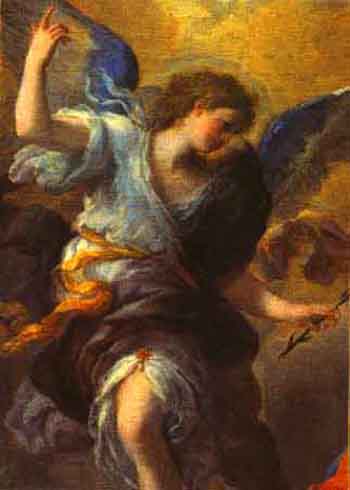
Gabriel is an archangel whose name means "God is my strength" and who is the one of the most beloved of all members of the heavenly host. Gabriel is also one of the highest ranked of all angels and is only one of two (or three) actually named angels in the entire Bible, with Michael and Raphael.
Among the Jews, Gabriel's power and strength-as implied by his very name-were frequently noted in legends and tales. He has been called the angel of the power of God and also the angel of judgment and has been equated with thunder and majesty.
In the role of judgment angel he will supposedly appear on the last day and blow the final trumpet that will call all of the living and the dead to come forth and face the final, irrevocable judgment of the Lord. Known in the Arabic as Jibril, Gabriel has a prominent role in Islamic teachings, for he believed to have dictated the entire Qur'an, surah by surah, to Muhammad and is called the angel of truth and the chief of the four favored angels.

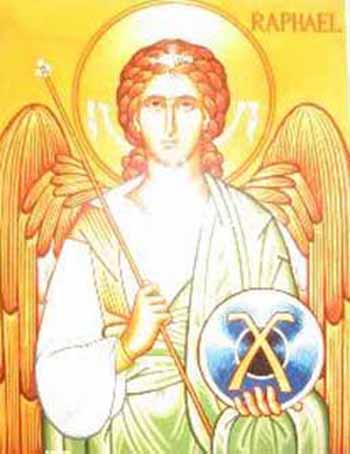
Raphael is one of the seven archangels and one of the best loved of all angels. Raphael is honored as the regent of the sun, the angel of healing, the angel of science, the angel of knowledge, head of the guardian angels, and chief of the angelic orders of virtues, although he is also a member of the seraphim, the dominations, and the cherubim.
Raphael, whose name means "God has healed," is best known for his appearance in the Book of Tobit. Raphael is said to possess the happiest disposition of any of the angels, having as well the best sense of humor. This may well be a result of his close relationship with the sun; he is, after all, regent of the orb and was called by the poet Longfellow the angel of the sun. He delights in bringing health, happiness, and joy everywhere he goes and encourages the guardian angels in their work.

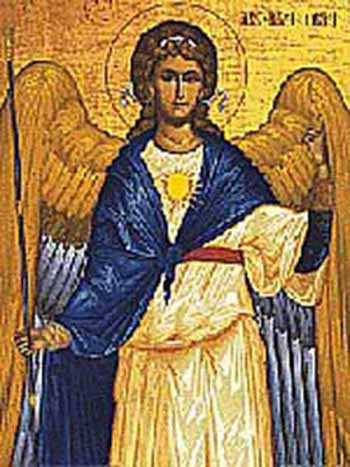
Uriel is one of the archangels of post-Exilic Rabbinic tradition, and also of certain Christian traditions. His name may have analogies with Uriah. In apocryphal, kabbalistic and occult works Uriel has been equated or confused with Urial, Nuriel, Uryan, Jeremiel, Vretil, Sariel, Suriel, Puruel, Phanuel, Jehoel, Jacob, Ezrail/Azrael and Israfil/Raphael.


Elijah is a prophet of the Hebrew Bible or Old Testament. His name has been variously translated as "the Lord is God", "whose God is the Lord", "God the Lord", "the strong Lord", "God of the Lord", "my God is the Lord", "the Lord is my God", and "my God is Jehovah".

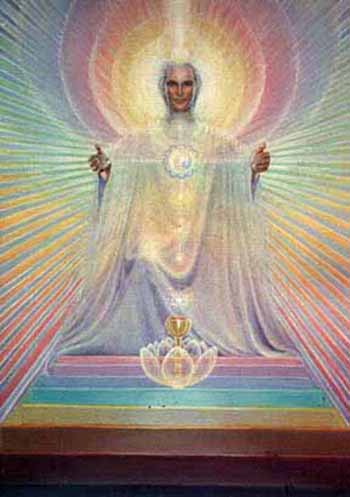
Metatron is linked with creation and Sacred Geometry.


Enoch

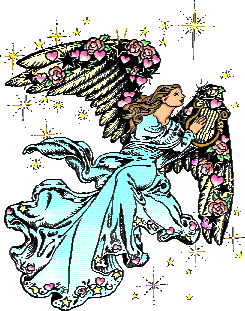
Angels
Wikipedia

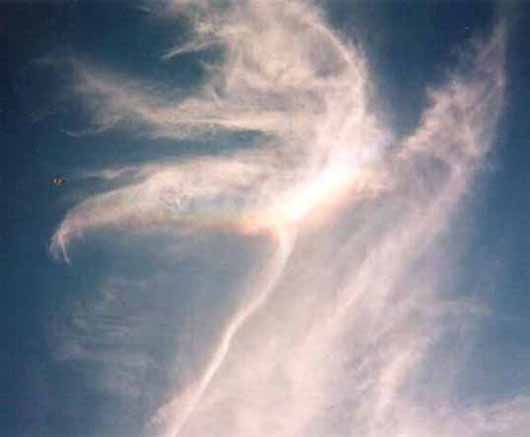
Cloud Formations


Smoke Formation
- Astronomy Picture of the Day - August 22, 2006
